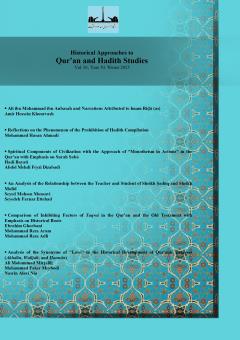Analysis of the Synonyms of "Love" in the Historical Development of Qur'anic Exegeses (Akhdān, Walījah, and Ḥannān)
Subject Areas : -
Ali Mohammad Mir Jalili
1
,
Mohammad Faker Meybodi
2
,
Nasrin Alavi Nia
3
*
![]()
1 - Professor of the Qur’an and Hadith Department, Faculty of Theology, Meybod University, Meybod, Iran.
2 - Professor of the Qur’an and Hadith Department, Al-Mustafa International University, Tehran, Iran.
3 - Seminary Student, Level 4, Al-Noor Higher Education Institute, Shiraz, Iran (corresponding author).
Keywords: Holy Qur'an, Historical Development, Akhdān, Walījah, Ḥannān, Love.,
Abstract :
This article employs a descriptive-analytical method with library tools to explore the synonyms of the word "love" in the Qur'an (akhdān, walījah, and ḥannān). Some lexicographers define akhdān as a general term for friend and companion, while others interpret it as a form of friendship driven by selfish desires. The term applies equally to both males and females, referring to a kind of secretive friendship that does not lead to family formation but rather satisfies sexual instincts. Most classical interpreters have supported this meaning. Walījah refers to a friend, companion, and confidant, and is used both in singular and plural forms. It often implies secretive relationships intended for deceit or trickery. Numerous scholars have interpreted this term as baṭānah and some as dakhīlah. Ḥannān is used to denote mercy, affection, and tenderness. Most interpreters associate it with raḥmah (mercy), and some have described it as tenderness and compassion.

